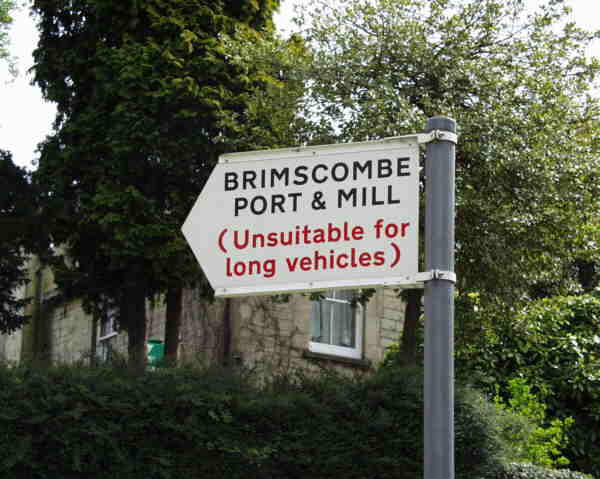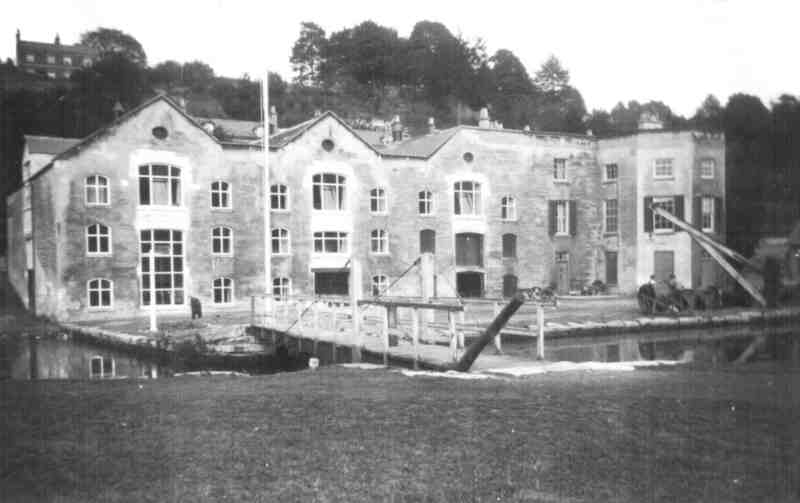 Brimscombe
was bound to become significant when the decision was made, prior to
its construction, to design the canal to accommodate Severn Trows to
the west and Thames (Western) Barges to the east. The longer narrower
Thames Barges could not pass through the Stroudwater Navigation, which
had already been built, as they were about 20 feet too long. Building
the T&S Canal about 4 feet wider to take Severn Trows all the way
to the Thames would have had required the tunnel and canal to be wider
and would have made getting it through some of the pinch points further
up the valley more expensive and difficult.
Brimscombe
was bound to become significant when the decision was made, prior to
its construction, to design the canal to accommodate Severn Trows to
the west and Thames (Western) Barges to the east. The longer narrower
Thames Barges could not pass through the Stroudwater Navigation, which
had already been built, as they were about 20 feet too long. Building
the T&S Canal about 4 feet wider to take Severn Trows all the way
to the Thames would have had required the tunnel and canal to be wider
and would have made getting it through some of the pinch points further
up the valley more expensive and difficult.The T&S Canal Company took the view that there would be money to be made transshipping the goods from one type of craft to the other so they made sure that this would happen on their canal rather than it happening at the junction with the Stroudwater. The theory was slightly flawed in that it was not long before it was realised that boats the length of the Severn Trow but with the beam of a Thames Barge could get right through without being stung by transshipment costs or the associated delays. In the long run, the long boat (as it was known hereabouts but generally known as the narrow boat) which was even narrower that the Thames Barges became the normal craft using the canal.
There were boat building businesses operating both above and below the port and the whole area must have seemed a hive of activity.
There were many buildings at Brimscombe with the main warehouse, offices and agent's house being the best known. There was also an island in the massive basin where coal could be stored and secured by locking open the two swing bridges which gave access to it.
 After
the canal was taken over by Gloucestershire County Council in 1900, the
main warehouse was converted and used for educational purposes. It
survived intact and in good condition until its destruction in 1965
when the whole port area was converted into an industrial estate. One
of the few original buildings still standing on the site is the little
salt warehouse which now sits on its own in the middle of a car park.
The industrial buildings on the north side of the port area which
replaced the headquarters building and warehouse have mounted on them a
milestone plate and a commemorative plaque which talks about the port's
past importance. I bet those responsible for this plaque never
anticipated that their buildings would one day be demolished in order
to put the port back!
After
the canal was taken over by Gloucestershire County Council in 1900, the
main warehouse was converted and used for educational purposes. It
survived intact and in good condition until its destruction in 1965
when the whole port area was converted into an industrial estate. One
of the few original buildings still standing on the site is the little
salt warehouse which now sits on its own in the middle of a car park.
The industrial buildings on the north side of the port area which
replaced the headquarters building and warehouse have mounted on them a
milestone plate and a commemorative plaque which talks about the port's
past importance. I bet those responsible for this plaque never
anticipated that their buildings would one day be demolished in order
to put the port back!Another lost feature on the north side of the port was the boat weighing machine. This was added to the complex in the early 1840s as a means of preventing fraudulent declarations on the amount of tonnage being carried by boats. The machinery was scrapped in 1937 after the canal had closed.
The loss of Brimscombe Port was long regarded as the main impediment to the restoration of the canal. Various (expensive) schemes were proposed for getting round it including a tunnel under the valley side but it was obvious for a long time that the restoration of the canal coupled with the redevelopment of the whole port area would be far less expensive and possibly profitable given the premium of waterside developments. As so upon learning that one of the main owners had ceased trading, British Waterways, with assistance from the South West Regional Development Agency, stepped in and bought the land.
It has been found that the port basin itself has had all sorts of undesirable material dumped in it which will be expensive to dispose of but in the end, the canal will be put back and there will be a port again at Brimscombe.